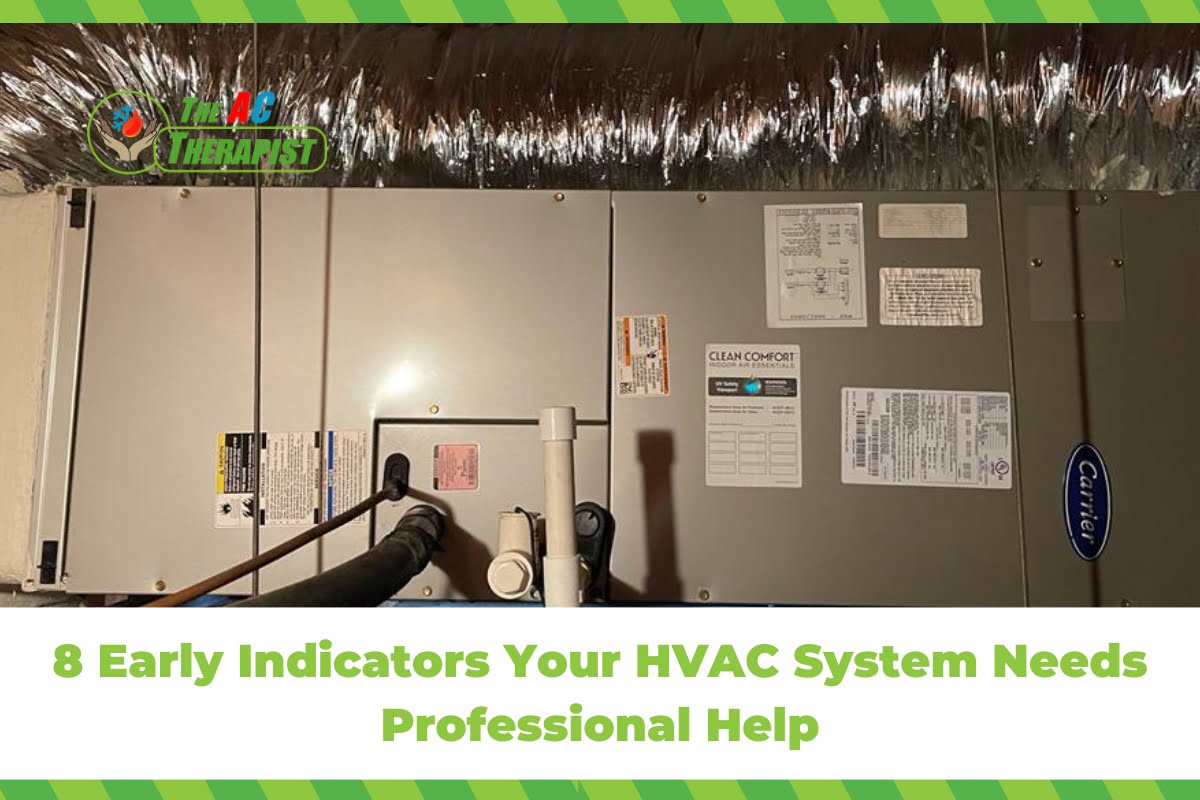8 Early Indicators Your HVAC System Needs Professional Help
Maintaining a functional and efficient HVAC (Heating, Ventilation, and Air Conditioning) system is essential for creating a comfortable indoor environment. HVAC systems play a crucial role in regulating temperature, ensuring proper airflow, and maintaining indoor air quality. However, like any complex system, HVAC units can experience issues that, if left unaddressed, can lead to costly repairs and reduced performance. In this comprehensive guide, we will explore how to spot HVAC issues before they escalate, allowing you to take proactive steps to ensure the longevity and efficiency of your system.
- Irregular Temperatures and Airflow: One of the first signs of potential HVAC problems is the presence of irregular temperatures and uneven airflow throughout your living or working space. Have you ever noticed certain rooms feeling cooler or warmer than others? This phenomenon can be an indication of underlying issues within the system. Cold spots might suggest problems with inadequate insulation or duct leakage, while hot spots could signify blocked vents or improper airflow distribution. Keeping an eye on temperature discrepancies and airflow imbalances can help you catch these issues early and prevent discomfort.
- Unusual Noises and Sounds: Your HVAC system should operate quietly and efficiently. Unusual noises like grinding, banging, hissing, or rattling can be alarming and indicate mechanical problems or loose components. A humming sound may suggest a problem with the blower motor or a misaligned fan. Pay attention to any sudden changes in noise levels, as they can be a sign that something is amiss within your system. Addressing these unusual sounds promptly can prevent further damage and potential breakdowns.
- Increased Energy Bills: While fluctuations in energy bills are normal, a sudden and consistent increase in your monthly expenses without a corresponding change in usage could point to HVAC issues. Inefficient systems, such as those with dirty filters, refrigerant leaks, or malfunctioning components, can consume more energy to maintain the desired temperature. Tracking your energy bills and investigating unexpected spikes can help you identify potential problems and take action before your wallet takes a hit.
- Frequent Cycling and Short Cycling: HVAC systems typically cycle on and off to maintain the desired temperature. However, if you notice your system cycling frequently or short cycling (turning on and off rapidly), it could be struggling to reach or maintain the set temperature. Short cycling can strain the system, reduce its efficiency, and lead to premature wear and tear. Possible causes include refrigerant leaks, thermostat malfunctions, or inadequate airflow due to clogged filters. Monitoring your system’s cycling patterns can give you valuable insights into its performance.
- Leaks, Moisture, and Water Damage: Water-related issues around your HVAC unit can have serious consequences. Leaks and moisture can result from condensate drain blockages, refrigerant leaks, or improper installation. These issues not only compromise your system’s efficiency but can also lead to mold growth and damage to your property. Regularly inspect the area around your HVAC system for signs of leaks or moisture, such as water stains or pooling water, and take swift action if you suspect any water-related problems.
- Strange Odors and Indoor Air Quality: Your HVAC system should distribute clean, odorless air throughout your space. Unpleasant or strong odors coming from the vents could indicate problems such as mold growth or burning wires. Musty odors might suggest mold in the ductwork, while a burning smell could point to an electrical issue. If you notice persistent or unusual odors, it’s important to address them promptly to maintain indoor air quality and prevent potential health issues.
- Thermostat and Control Issues: The thermostat serves as the control center of your HVAC system, so any problems with it can affect your system’s performance. Inaccurate temperature readings, difficulties adjusting settings, or inconsistencies between the set temperature and the actual temperature are signs of potential thermostat issues. A malfunctioning thermostat can cause your system to overwork or underperform, leading to discomfort and energy wastage. Regularly check your thermostat’s accuracy and responsiveness to ensure proper system control.
- Visual Inspections and Maintenance: Regular visual inspections of your HVAC system can reveal visible damage or wear and tear. Rust, corrosion, and physical damage to components can indicate potential problems. Inspect your system’s outdoor and indoor units, as well as the ductwork, for any signs of deterioration. While visual inspections are beneficial, professional maintenance is equally important. Enrolling in maintenance plans offered by HVAC contractors can ensure thorough system checks, cleanings, and adjustments, helping you catch and address issues before they worsen.
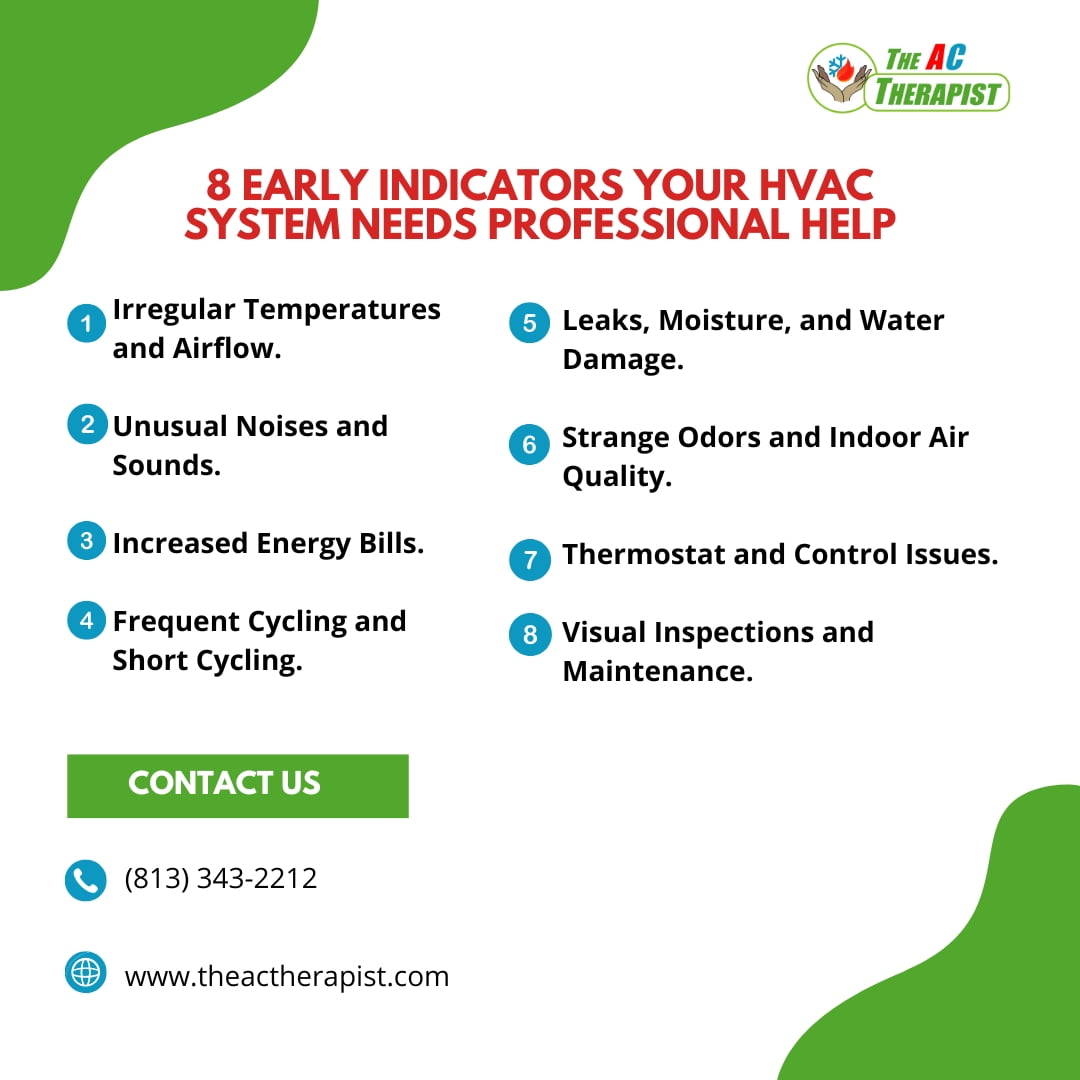
DIY vs. Professional Evaluation: Making Informed Choices for Your HVAC System
While it’s important to be vigilant in spotting potential HVAC issues, there are limits to what you can diagnose and address on your own. While DIY inspections and maintenance can help you catch minor issues, complex problems often require the expertise of professional HVAC technicians. If you encounter issues beyond your knowledge or comfort level, it’s best to seek professional assistance. Their experience and diagnostic tools can pinpoint problems accurately and provide effective solutions.
Being proactive in identifying HVAC issues before they escalate can save you time, money, and the inconvenience of unexpected breakdowns. Regularly monitoring your system for irregular temperatures, unusual sounds, increased energy bills, cycling patterns, leaks, odors, thermostat problems, and visible damage can help you maintain a comfortable and efficient indoor environment. Remember that professional maintenance and evaluations are crucial for addressing complex issues and ensuring the optimal performance of your HVAC system. By taking these steps, you can extend the lifespan of your HVAC unit and enjoy the benefits of a well-functioning system for years to come.
Maintaining a well-functioning HVAC (Heating, Ventilation, and Air Conditioning) system is essential for creating a comfortable indoor environment. Regular maintenance and timely issue detection play a significant role in ensuring the longevity and efficiency of your HVAC system. However, when it comes to diagnosing and addressing potential issues, you might find yourself at a crossroads between DIY (Do It Yourself) evaluation and seeking professional expertise. In this article, we’ll explore the pros and cons of both approaches, helping you make informed decisions about maintaining the health of your HVAC system.
DIY Evaluation
Advantages of DIY Evaluation:
- Cost Savings: DIY evaluation can save you money initially, as you won’t incur expenses for professional services.
- Immediate Action: DIY evaluation allows you to address minor issues promptly without waiting for an appointment with a professional.
Potential Pitfalls of DIY Evaluation:
- Limited Expertise: Most homeowners lack the specialized knowledge and tools needed to diagnose complex HVAC issues accurately.
- Misdiagnosis: Attempting DIY evaluation without proper understanding can lead to misdiagnosis, resulting in incorrect or ineffective repairs.
- Safety Concerns: HVAC systems involve electrical components and potentially hazardous substances like refrigerants. Inadequate knowledge could lead to safety hazards.
Best Practices for DIY Evaluation:
- Regular Inspection: Conduct routine visual inspections of your HVAC system, checking for visible damage or irregularities.
- Changing filters: Stay vigilant about changing air filters regularly to maintain proper airflow and indoor air quality.
- Cleaning Vents: Keeping vents clean and unobstructed can enhance system performance.
Professional Evaluation
Advantages of Professional Evaluation:
- Expertise: HVAC professionals possess in-depth knowledge, training, and experience to accurately diagnose complex issues.
- Comprehensive Assessments: Professionals use specialized tools and diagnostics to identify hidden problems that DIY evaluations might miss.
- Preventative Measures: HVAC technicians can identify potential issues before they escalate, saving you from costly repairs down the line.
Considerations for Professional Evaluation:
- Cost Investment: Seeking professional evaluation involves upfront costs, but it can prevent larger expenses by addressing issues correctly.
- Time Efficiency: Professionals can quickly diagnose and repair problems, saving you time compared to troubleshooting on your own.
- Long-Term Benefits: Proper professional evaluations and maintenance extend the lifespan of your HVAC system, enhancing its efficiency and performance.
When to Opt for Professional Evaluation:
- Unusual Noises: If your HVAC system starts making unusual sounds, it’s best to consult professionals for accurate diagnosis.
- Complex Repairs: For intricate repairs involving electrical components, refrigerants, or advanced technical knowledge, professional help is crucial.
- Major Malfunctions: When your HVAC system experiences major malfunctions or a sudden decrease in performance, professional intervention is recommended.
In the battle between DIY evaluation and professional expertise, both have their merits. For simple tasks like changing filters and basic maintenance, DIY can be cost-effective and efficient. However, for intricate repairs, accurate diagnosis, and comprehensive system evaluations, professional assistance is essential. Balancing your DIY efforts with the need for professional expertise ensures that your HVAC system receives the care it deserves. By being aware of your system’s limitations and your own capabilities, you can make informed choices that lead to a comfortable and well-maintained indoor environment. Remember, your HVAC system’s health is an investment in your comfort and the efficiency of your home.
What are the long-term benefits of engaging HVAC professionals for accurate system evaluations?
Engaging HVAC professionals for accurate system evaluations offers several long-term benefits. Firstly, their expertise ensures early issue detection, preventing minor problems from escalating into major, costly repairs. Proper evaluations also optimize system performance, increasing energy efficiency and reducing utility bills. Additionally, regular professional assessments extend the lifespan of your HVAC system, saving you from premature replacements. Ultimately, their specialized knowledge guarantees a comfortable and well-maintained indoor environment, enhancing your overall quality of life.
- Prevent Costly Repairs: HVAC professionals possess the knowledge to identify small issues before they turn into major problems. By addressing these concerns early, you can avoid costly emergency repairs that could result from neglecting maintenance.
- Enhance Energy Efficiency: Accurate system evaluations by professionals ensure that your HVAC system operates at its peak efficiency. Properly functioning systems consume less energy, leading to lower utility bills and reduced energy waste over time.
- Extend System Lifespan: Regular evaluations by professionals help to extend the lifespan of your HVAC system. Addressing minor issues promptly prevents unnecessary wear and tear on components, ensuring that your system lasts longer before needing replacement.
- Optimize Performance: A well-maintained HVAC system performs better in terms of both heating and cooling. When professionals evaluate your system accurately, they can fine-tune its operation, resulting in improved comfort and more consistent temperatures throughout your space.
- Ensure Indoor Air Quality: HVAC professionals not only assess your system’s performance but also evaluate its impact on indoor air quality. Regular evaluations and maintenance help prevent dust buildup, mold growth, and other factors that can negatively affect the air you breathe.
- Safety Assurance: HVAC systems involve complex electrical and mechanical components. Professionals ensure that your system operates safely by identifying and rectifying potential hazards, such as gas leaks or faulty wiring.
- Compliance and Warranty: Engaging professionals for system evaluations can help you comply with manufacturer warranties and any required maintenance schedules. Regular professional evaluations can help preserve the validity of warranties, which might cover certain repairs or replacements.
- Peace of Mind: Knowing that your HVAC system is regularly evaluated by professionals provides peace of mind. You can trust that experts are monitoring its health and taking the necessary actions to ensure optimal operation.
- Customized Solutions: HVAC professionals offer personalized solutions based on your system’s specific needs. They can recommend adjustments, repairs, or upgrades that suit your system’s requirements, ensuring its longevity and efficiency.
- Time Savings: Professionals have the training and tools to quickly and accurately assess your system. This saves you time compared to attempting to diagnose issues yourself and potentially missing critical problems.
Incorporating HVAC professionals into your system’s maintenance routine brings a host of long-term advantages. By investing in accurate evaluations and professional care, you’re investing in the comfort, efficiency, and longevity of your HVAC system, ultimately contributing to a healthier and more comfortable living environment.
What problems are most likely on a typical HVAC system?
A typical HVAC system can experience various problems, including:
1. Clogged Air Filters: Dirty or clogged filters can restrict airflow, reducing system efficiency and indoor air quality.
2. Thermostat Issues: Incorrect readings, calibration problems, or malfunctioning thermostats can lead to temperature inaccuracies.
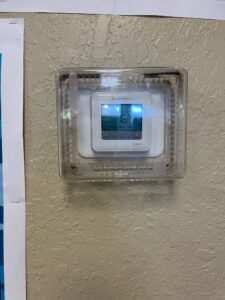
3. Refrigerant Leaks: Leaks in the refrigerant lines can cause cooling inefficiencies and potential harm to the environment.
4. Electrical Problems: Wiring issues, blown fuses, or malfunctioning capacitors can disrupt system operation.
5. Compressor Failures: The compressor is a vital component, and issues like overheating or motor failures can lead to system breakdowns.
6. Frozen Evaporator Coils: Insufficient airflow, low refrigerant levels, or other factors can cause the evaporator coils to freeze, impacting cooling.
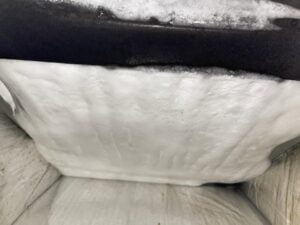
7. Condensate Drain Blockages: Clogged drain lines can result in water leaks and potential mold growth.
8. Blower Motor Problems: Malfunctions in the blower motor can lead to poor airflow and discomfort.
9. Ductwork Issues: Leaks, poor insulation, or improper design can lead to uneven heating or cooling and energy waste.
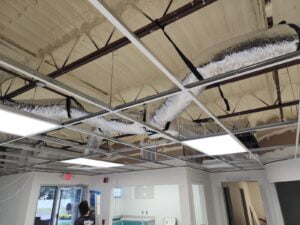
10. Ignition or Pilot Issues (for Heating Systems): Furnaces can experience problems with ignition or pilot lights, affecting heating.
11. Carbon Monoxide Leaks (for Gas Systems): Gas-powered systems can develop leaks, posing a serious safety risk.
12. Fan Problems: Malfunctioning fans can affect airflow and system efficiency.
Regular maintenance and prompt addressing of issues can help mitigate these common problems and extend the life of your HVAC system.
What types of unusual sounds might indicate that your HVAC system requires professional evaluation?
Unusual sounds from your HVAC system can be indicative of underlying issues. Some types of sounds that might signal the need for professional evaluation include:
- Banging or Clanging: Loud banging or clanging noises often suggest that there are loose or broken components within the system, such as a blower wheel or motor mount.
- Squealing or Screeching: High-pitched squealing or screeching sounds can indicate issues with belts that have worn out or slipped out of place.
- Rattling: Rattling noises might be caused by loose parts, debris, or even ductwork that’s come loose.
- Hissing or Whistling: Hissing or whistling sounds could point to air leaks in the ductwork or problems with the refrigerant lines.
- Clicking: While some clicking sounds are normal during system startup and shutdown, persistent clicking could indicate an electrical issue.
- Gurgling or Bubbling: These sounds could be related to a refrigerant leak, air trapped in the lines, or issues with the condensate drainage system.
- Thumping: Thumping sounds might be caused by an imbalanced blower fan or other mechanical issues.
- Buzzing: A constant buzzing noise could be due to issues with electrical components, such as a faulty capacitor or loose wiring.
If you hear any of these unusual sounds coming from your HVAC system, it’s advisable to consult HVAC professionals for a thorough evaluation. Ignoring these sounds could lead to more extensive and costly problems down the line.
Should I replace my HVAC before it fails?
Yes, considering replacing your HVAC system before it fails can be a wise decision. Proactively replacing an aging or inefficient system can prevent unexpected breakdowns, discomfort, and emergency replacements. Look for signs such as frequent repairs, declining performance, rising energy bills, and older age (typically 15-20 years) to determine if replacement is a prudent choice. Consulting HVAC professionals can help you make an informed decision based on your specific situation.
Embrace Expert Care: The AC Therapist Ensures Your HVAC System’s Longevity and Comfort
In conclusion, being attuned to the early indicators that your HVAC system requires professional help is an essential aspect of responsible maintenance. Just as a healthcare professional can diagnose subtle symptoms in your well-being, The AC Therapist, with their expertise in HVAC systems, can identify and address issues before they escalate into major concerns. Ignoring the signs can lead to discomfort, higher energy bills, and potential system breakdowns.
By collaborating with The AC Therapist, you’re investing in the health and longevity of your HVAC system. Their specialized knowledge and advanced diagnostics ensure that your system’s performance and efficiency remain at their peak. Whether it’s addressing uneven heating, diagnosing unusual sounds, or preventing energy wastage, their team offers solutions tailored to your system’s unique needs.
Remember, timely intervention not only preserves your comfort but also safeguards your investment. The AC Therapist’s commitment to quality service and expert evaluation allows you to enjoy uninterrupted indoor comfort while minimizing the risk of unexpected and costly repairs.
When it comes to maintaining your HVAC system’s health, entrust your comfort to The AC Therapist’s professional care. Let their expertise ensure that your HVAC system operates seamlessly, providing you with the peace of mind you deserve.

